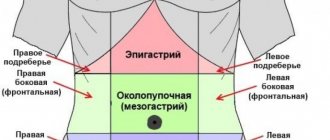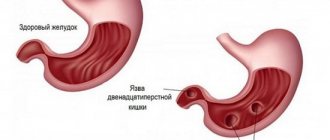Why you can't join the army with an ulcer
Young people, including men of military age, also suffer from gastrointestinal diseases. If they are diagnosed with a duodenal ulcer or gastric ulcer, they are not called up. This is a chronic disease that cannot be eliminated, although the patient may have long periods of remission when his health improves.
There are no conditions for a sick person
The patient’s body is very vulnerable, and many factors can lead to an exacerbation of the disease:
- Nutrition. A sick person should eat often and in small portions. He will have to adhere to a certain diet all his life. The army cannot create such conditions; there is one routine for everyone.
- Loads. The army is not a resort where you can do what you want. A person is seriously preparing for military life, and this is not possible without enormous physical exertion.
- Stress. The young man is not used to such an environment; relationships with colleagues do not always work out, and so on. All this can cause severe stress, and they are contraindicated for ulcers.
- Inappropriate daily routine. Soldiers often do not have time to get enough sleep or rest; they also have anxiety at night; all this cannot but affect the patient’s condition.
Possible exacerbations
This is a chronic disease, even with the most favorable course of the disease, scars remain on the duodenal mucosa.
The place that has become healed can no longer perform its duties, that is, the well-being of a sick person, even if he currently has no special health problems, will differ from the well-being of a healthy person. If a person is in the military and does not receive proper treatment, he may develop life-threatening complications.
This may be a perforation of the ulcer, which leads to peritonitis, or bleeding from the ulcer, which can cause anemia. Without timely medical intervention, the patient will die, and often every minute is important. The soldier does not have the discretion to visit the doctor, and when permission is granted, valuable time will be lost.
Reviews
Reviews about the presence of ulcers and military service have different opinions, since the assignment of the appropriate category depends on the severity of the disease, the number of exacerbations and the presence of complications after the illness.
I was diagnosed with a stomach ulcer at the age of 20 during a commission at the military registration and enlistment office. They sent me for additional examination, and as a result, I was assigned category “G”. Now I am undergoing a course of treatment, and then I will give repeated tests.
Ilya, Saransk
In my case, the ulcer is chronic, despite my young age of 23 years. Unfortunately, this is the result due to poor nutrition. The military registration and enlistment office gave me a deferment, so in a year I will go through the commission again. At the same time, the doctor said that, most likely, they would give him a complete exemption from military service.
Taras, Khabarovsk
Ulcer - limited use
According to the law, a person who has a duodenal ulcer or stomach ulcer does not have the right to be drafted into the army. However, it is considered to be of limited fitness (category B). He is enlisted in the reserves and given a military ID. What is category B?
There are 5 categories in total. If category A is awarded, then the young man is fit for service, B - he is called up, although there are restrictions. D - not fit for service, and B - it is considered that he can serve, but he is exempt from conscription in peacetime. In addition, there is category G, for which a deferment of six months is given.
According to Article 58, a duodenal ulcer, no matter what stage the disease is in (remission or exacerbation), regardless of the duration of remission, is given fitness category B. Regardless of how the conscript feels, even if he has no complaints, take him away should not join the army.
Stomach ulcer and category “B”
Fitness category “B” is most often assigned when diagnosing a gastric ulcer. In this case, the conscript is transferred to the reserve for peacetime if the following symptoms are identified:
- The size of the resulting erosion is at least 3 cm;
- The presence of frequent relapses;
- Poor scarring of the ulcer;
- The bulb ulcer formed within 5 years after the first diagnosis;
- Prolonged bleeding.
In order to confirm the existing diagnosis, the conscript may be sent for additional examination (endoscopy, biopsy, sampling of gastric juice).
Unfit for service
Some conscripts may also be classified as category D, that is, considered completely unfit for service. They will not be called up in wartime either. These are young people who have the following pathologies:
- The disease proceeded with complications, that is, there was either perforation of the ulcer or penetration. If a person has been suffering from this disease for a long time, this can cause pyloric stenosis, which causes the patient to lose a lot of weight.
- Severe bleeding began from the ulcer, due to which the blood volume decreased by 30%.
- An operation was performed on the duodenum, because of which the patient was forced to eat poorly, and his body weight decreased significantly.
Main contraindications for conscription into the army
When assigning fitness to a conscript, the military medical commission is guided by the schedule of illnesses - a list containing a list of pathologies prohibiting service. Not conscripted, have category “B”:
- frequent, rare relapses of ulcers;
- the size of the ulcer is more than 3 cm;
- the presence of extra-bulbous lesions earlier than 5 years after the initial diagnosis;
- low effect of the therapy (poor scarring);
- condition after surgery;
- complications associated with gastric bleeding.
Exemption from service under category “D” is given to conscripts with severe diseases of the intestinal tract:
- deformation, absence of part of the stomach as a result of the operation;
- repeated gastric bleeding with blood loss up to 30%;
- complete dysfunction of the gastric tract.
Any of the fitness categories is issued by a military commission and does not require re-examination during the next conscription campaign.
Re-examination
Many are concerned about the question of whether it is necessary to undergo re-examination if one or another category has already been assigned. Previously, a person had to undergo re-examination every 3 years. But in 2005, Russian Government Decree No. 886 appeared, which states that there is no need to constantly confirm the diagnosis.
The commission’s decision cannot be changed; a person with category B cannot count on being assigned a higher category. Therefore, those who receive military tickets after 2005, including in 2016, 2021, 2021 and so on, do not need to worry; re-examination is not required with a duodenal ulcer or other disease.
Contract service in the army for ulcers
Many young people are interested in the question: “Are people with ulcers recruited into the army under a contract?” If you have a pathology of the gastrointestinal tract that is in remission, you can serve in the army under a contract, but with some restrictions.
But contraindications to serving in the army under a contract include:
- many ulcers;
- wounds with a diameter of more than three centimeters;
- relapses more than 2 times a year;
- within 5 years after surgery;
- ulcers that do not heal for more than three months;
- anemia after prolonged bleeding;
- the presence of rough scars in the stomach.
Proof of disease
If you come to the military registration and enlistment office, you need to prove that you have this disease. The presence of certain symptoms does not mean anything. The military medical commission should not be involved in diagnosing and treating conscripts; moreover, it does not have the right to do this. The commission must only decide whether the young man is fit for service or not. To make this decision, she must have medical documents that confirm the presence of this disease.
How to act
The conscript does not just come and say that he is sick, but performs a number of actions:
- Even before military conscription, he goes to the clinic. There he was supposed to be diagnosed and prescribed a course of treatment.
- Then you need to go to the military registration and enlistment office and write a corresponding application.
- After receiving the summons, come to the medical commission, taking all the certificates, tests and examinations.
- Obtain the appropriate fitness category. If the conscript believes that a mistake was made, go to court to appeal this decision. While he is suing, they cannot draft him into the army.
What to bring with you
The fact that the conscript is sick, that is, he has a duodenal ulcer, must be confirmed by an endoscopic examination or an x-ray examination; the results of both examinations can be brought. Even if the patient has a period of stable remission, the following signs indicate that there was a duodenal ulcer:
- Post-ulcer scar, which is visible on fibrogastroscopy.
- Severe cicatricial deformation of the bulb, which can be detected by duodenography under conditions of artificial hypotension.
Without this evidence, there is no point in counting on the young man not being drafted into the army. The council may send the conscript to another commission, an additional one. An examination is carried out in the hospital, where a diagnosis can be made and a course of treatment can be prescribed. If a conscript refuses this commission, all his documents are considered invalid and he may be sent to the army.
With a duodenal ulcer, a person is considered to be of limited fitness, that is, he is not conscripted into the army in peacetime. But it is necessary to prove the presence of this disease.
Stomach ulcer and fitness category “D”
Fitness category “D” is assigned for severe ulcers, when the disease has caused a disruption in the functioning of important systems in the body:
- Inoperability of a common ulcer;
- The ulcer has spread beyond the stomach;
- Disruption of the nutritional process after surgery, and BMI does not exceed 19;
- Stenosis of the pylorobulbar zone (delay of contrast agent in the stomach);
- Removal of part of the stomach or complete resection of the organ;
- Digestive problems due to the resulting gastrointestinal pathologies that cannot be treated;
- Severe gastroduodenal bleeding.
In order to receive complete exemption from the army if you have a stomach ulcer, you must submit the following documents to the military registration and enlistment office:
- Conclusion of a gastroenterologist;
- Results of the completed FGS;
- Laboratory tests;
- X-ray images.
What else to read:
- Symptoms and treatment of inflammation of the duodenum Contents of the article:1 Classification of duodenitis2 Chronic duodenitis2.1 Symptoms2.2 How to treat3 Acute duodenitis4 Consequences5 Prevention Duodenitis - inflammation of the duodenum - occurs quite often, especially in pediatric patients. This……
- Symptoms and treatment of chronic gastroduodenitis in the acute stage Contents of the article:1 About the disease2 Causes of appearance3 Symptoms4 Pain5 Indigestion6 General deterioration of health7 Diagnosis8 Treatment Chronic gastroduodenitis is a disease in which both the mucous membrane of the stomach and...
- What is superficial duodenitis and how to treat it Contents of the article:1 Causes of the disease2 Forms of duodenitis3 Symptoms of the disease4 Diagnosis5 Treatment5.1 Diet5.2 Treatment with drugs5.3 Traditional methods Superficial duodenitis is a type of duodenitis, that is, inflammation of the duodenum,......
What is an ulcer and why is it so dangerous for a conscript?
The ulcer itself represents a violation of the integrity of the gastric mucosa. In the early stages, the disease can make itself felt only by mild nausea, heartburn and unpleasant sensations in the abdomen. The patient may not even pay any attention to the problem at first, attributing the symptoms to poisoning or eating poor quality food.
Without timely treatment, the ulcer results in frequent and prolonged headaches, vomiting, and attacks of acute pain in the abdominal area. Sooner or later, without the necessary treatment, the disease develops into serious problems, which become much more difficult to solve.
In addition, peptic ulcer of the stomach or duodenum affects not only the functioning of the digestive organs, but also other vital processes in the body. That is why it is so important for young people of military age to diagnose a stomach or duodenal ulcer in a timely manner, since serving in the military army with this disease is extremely dangerous.
The thing is that the presence of this disease implies regular examination by the attending physician and periodic treatment in a hospital setting.
For patients diagnosed with a stomach ulcer, the doctor prescribes a certain diet, adherence to a strict diet and refusal of regular exercise.
In addition, stress is contraindicated for such patients and a measured, calm rhythm of life without any shocks or stress on the psyche is recommended.
Life in the conditions of army life in one way or another contradicts the previously described rhythm of life, which will inevitably entail a further deterioration in the health of the serviceman.











